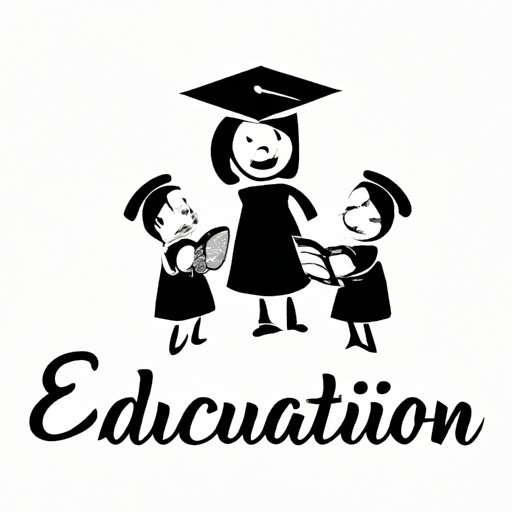
Introduction
Primary education is the first phase of formal education that all children around the world receive. It typically includes students between the ages of six and eleven, and it lays the foundation for future academic and personal success. In this article, we will explore the importance of primary education, the curriculum and teaching methods used, the impact of early childhood education, and the role primary education plays in setting students up for growth and development.
The Importance of Primary Education: Building a Strong Foundation for Lifelong Learning
Primary education lays the foundation for all future academic and personal success. It is a critical time in a child’s life, and the quality of education received during this time can make a significant impact on their future. Studies have shown that children who receive quality primary education are more likely to succeed academically, have better job opportunities, and earn higher salaries later in life.
Research has also shown that primary education can help reduce poverty, create a more stable society, and improve overall health outcomes. Providing children with access to quality education can help break cycles of poverty and help families achieve upward social mobility.
What Does Primary Education Entail? Exploring the Curriculum and Teaching Methods
The curriculum in primary education typically includes reading, writing, mathematics, science, and social studies. In addition, physical education, music, and art are also important components of primary education. Teachers use a variety of methods to teach these subjects, including lectures, group work, and interactive activities. They also use assessment methods such as quizzes and tests to measure student progress and adjust instruction accordingly.
The Significance of Early Childhood Education and Its Impact on Future Success
Early childhood education, which is often considered a part of primary education, is crucial for future success. Brain development during the early years is significantly impacted by the quality of education and experiences that children receive. Studies have shown that children who attend high-quality early childhood education programs are more likely to succeed in school, have better social skills, and have better health outcomes throughout their lives.
Children who receive high-quality early childhood education are also more likely to graduate from high school, attend college, and achieve long-term career success. Early childhood education programs provide children with a strong foundation for future learning and development.
How Primary Education Sets Students up for Academic and Personal Growth
Primary education is not just about academic learning. It is also about developing social skills, emotional intelligence, and creativity. Students who receive quality primary education have the opportunity to not only learn important academic skills but also to develop their personalities, interests, and passions.
For example, primary education can help students build confidence, develop communication skills, and learn how to work in groups. Many schools also offer extracurricular activities such as sports, music, and clubs to help students explore their interests and develop new skills outside of the classroom.
A Closer Look at Primary Education: History, Evolution, and Modern Day Practices
Primary education has a rich history that has evolved over time. In the early years of formal education, primary education was mostly focused on basic literacy and numeracy skills. As education became more accessible, primary education also evolved to include more subjects and skills.
Modern-day primary education includes a focus on technology, community involvement, and personalized learning. Teachers use technology to enhance learning experiences and to create a more engaging learning environment. Additionally, many schools now work with parents and community organizations to provide students with additional resources and support.
Conclusion
Primary education is a critical phase of formal education that lays the foundation for future academic and personal success. It provides children with the opportunity to develop important skills and knowledge that will be essential for their lifelong learning journey. As we have seen, primary education has evolved over time, and modern-day practices reflect a focus on technology, community involvement, and personalized learning. As we continue to value and support primary education, we can help ensure that all children have access to a quality education that can set them up for a bright and successful future.




